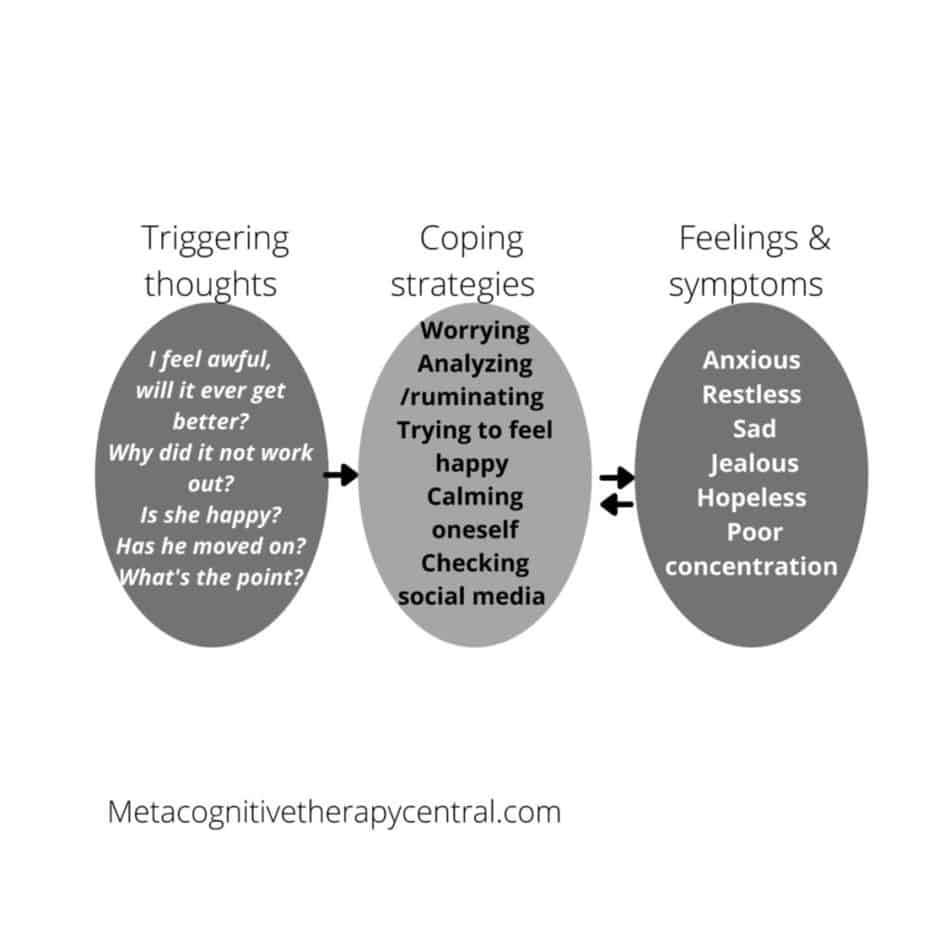
A psychologist once told me that getting over a break-up takes about two years, and I have since wondered how discouraging that sounded. If you find yourself amid a break-up, the prospect of two years of hurt, sadness, and anxiety feels like a very long time!
In reality, there is no time limit to when you can expect to recover after ending a romantic relationship. Rather, it depends on how much time you spend overthinking your situation and how many dysfunctional coping strategies you use to manage your grief.
Although there is no fast cure to help you get rid of your emotions, you can learn to regain control over your mind and move on faster by following this step-by-step guide.
Why will this approach help you get over a break-up?
The mind has a self-healing ability which means that it can process and recover from grief without our active interference (like overthinking to find solutions or thinking positive thoughts).
This means that the less time you spend overthinking the relationship, the faster you’ll start thinking about other things. The same applies to coping with feelings of sadness, anxiety, and jealousy; the more you allow yourself to feel the way you do without pushing negative feelings away, the faster you’ll recover.
Having many strong reactions after a break-up is normal and healthy, but the problem occurs when you feel ill-equipped to handle these upsetting emotions. At this point, many people, scared and clueless about handling negative feelings, start worrying and ruminating.
Unhelpful coping strategies that prolong your recovery
Overthinking (rumination and worry) intensifies grief, but it doesn’t stop there. People also start using coping strategies like reassurance-seeking, stalking, numbing, distracting, and sex to manage their intense emotions. But these coping strategies only add to the problem and become counterproductive because they make you feel less in control of your emotions.
Coping strategies don’t make you feel better but signal to your brain that negative emotions and overthinking is uncontrollable.

Now that you know what makes your grief worse, let’s dive into helpful metacognitive coping strategies.
Step 1) Let yourself feel negative emotions
It is easy to get overwhelmed by negative emotions like sadness, hopelessness, anxiety, anger, and jealousy and push them away in unhealthy ways. These include thought suppression, alcohol, medications, drugs, self-harm, and picking fights. However, these strategies DON’T WORK but will leave you feeling worse afterward.
Try instead to let yourself feel all of these feelings without trying to get rid of them. Let yourself feel sadness for as long as it takes if you feel sad. Don’t try to push it away or pretend otherwise if you feel hurt. Just let yourself feel whatever comes up but refrain from engaging with it. Negative emotions won’t prevent you from doing normal things.
Remember that negative feelings won’t harm you. For example, just because you feel anxious doesn’t mean you will get consumed and harmed by this feeling.
Step 2) Be aware of overthinking
Following a break-up, it is tempting to go over every detail to understand what really happened and how you could have avoided past mistakes.
However, you should try to avoid overthinking and analyzing because
1) overthinking (rumination) prolongs your grief
2) overthinking won’t help you find answers but will only confuse you.
There is a time and place to understand your past relationship and learn from your mistakes. Leave that to a later point because right now, you are not able to think straight. Instead, focus instead of reducing your overthinking. You can learn to do that with Detached mindfulness.

Step 3) Postpone thinking about your ex
If you must think about your ex (what is she/he doing and thinking? Did they already move on and found someone else? Are they okay?), try to postpone that to a fixed time during the day.
I usually advise my clients to allow themselves a 30-minute rumination window in the evening and instead focus on other productive activities outside of rumination time.
If you are unsure how to postpone rumination, read this post.

Step 4) Engage in meaningful projects
I am not advising you to distract yourself from your grief, but it is important that you cultivate meaningful activities. Ending a romantic relationship makes you crave something meaningful in your life, and without that, you will begin to feel hopeless.
Therefore, it is important to engage in meaningful activities like spending time with family and friends, starting your new business, or learning a new and helpful skill. These activities are not distractions but significant additions that will help you add meaning back to your life.
Step 5) Don’t stalk your ex
You stalk your ex for two reasons; to check whether they have moved on or whether they miss you. Basically, you seek reassurance or try to punish yourself, but neither will help you move on. On the contrary, reassurance seekings and punishment backfire and prolong your grief (because you are signaling to your brain that you want to feel bad).
Refrain from checking up on your ex, and completely delete them from your social media platforms. Instead, focus on launching your new business, working on interesting projects at work, or saving up for your traveling plans.
Use Detached mindfulness whenever you have the urge to check up on your ex.

Step 6) don’t rush into dating right away
Although it’s tempting to rush into a new relationship and get the validation that you crave, doing so is unwise for several reasons:
1) it is a temporary strategy that won’t help you get over your ex in the long term (you are only going to think more about them)
2) You are not the best version of yourself, so the chances are that you will make bad decisions that you might regret later
3) it is unfair for the new person you are seeing because you are not fully prepared to be there for them
4) you haven’t learned from past mistakes (if there were any), and you could end up making those mistakes again or choose the wrong type of person for you.
By all means, go out, have fun, and even flirt a little. But don’t jump right into the next relationship yet.
Step 7) Accept that you are not happy for a long time
The Metacognitive therapy approach is all about moving on with your life despite having negative feelings. I also talk about it in this post.
Accepting that you don’t feel happy or your best is key when it comes to fast recovery from a break-up. Don’t focus all your energy on feeling better, but instead leave it to your mind to self-regulate (process negative emotions faster). In the meantime, focus on your other goals, and happiness will eventually follow.

Don’t give up
There is no miracle cure for negative thoughts and feelings, so we have to learn to deal with them in the healthiest possible way. These MCT steps will get you results if you commit to them and don’t give up whenever your negative emotions persist. Good things in life need work and maintenance.
When you are ready to form a new romantic relationship, come back and read this and this post to help you overcome relationship difficulties.



